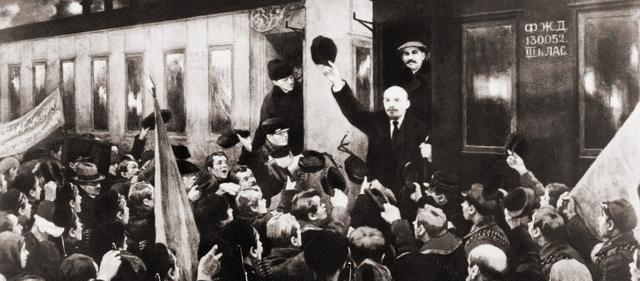9 April 1917, Zurich, Switzerland. A group of 32 Russians was waiting at the train station to leave. The attitude of the people in the station is roughly divided into two ways: supporters are singing the "Internationale" to bid farewell, and opponents are shouting "rogues, traitors" instead. Because the scene was so "hot", the railway was blocked for a while, and finally the train started.
The train was provided by Kaiser Wilhelm II, but its purpose was to promote the Russian Revolution in the hope that Russia would be able to withdraw from World War I and relieve the pressure on the German army. And it was none other than Vladimir Ilyich Ulyanov, known as "Lenin."

With the help of the Germans, Lenin ended his life in exile and returned to St. Petersburg, Russia. There, just after the end of the February Revolution, the last Tsar Nicholas II announced his abdication, and the Provisional Government took over the supreme power, but had no intention of withdrawing from the First World War.
Prussian sharp knives and proletarian iron fists
The news of Lenin's return to St. Petersburg attracted attention, and a message sent to the Foreign Office by the German Army Command read: "Lenin's entry into Russia was successful, and he is acting as you wish.".
This may seem like a political paradox: the emperor joins forces with the revolutionaries? But this is in fact an old diplomatic rule: "The enemy of the enemy is the friend." The Intention of the Germans was that Lenin would return to Russia and break the status quo in Russia, so that Russia could withdraw from the First World War and reduce the pressure on the German Army on the Eastern Front.
There is no doubt that they succeeded...
Tracing back to the roots, the idea was first proposed by a Russian Jew, "Israel Lazarevich Gelfonder", who at the time assumed the pseudonym "Parf".
At the end of 1914, he used his influence to propose to the German ambassador to Constantinople that the "sharp knife of Prussia be allied with the iron fist of the proletariat", claiming that the interests of Germany and the Russian revolutionaries were identical. After initial skepticism, Goldfeld's proposal gained german attention.
Israel Lazarevich Gelfonder
The "capitalists" of the Bolsheviks?
Gelfonder's first visit to Germany was in 1891, when he wrote for various left-wing newspapers under the pseudonym "Parf" and met with Karl Kautsky, Lenin, Trotsky, and others. But because Gelfund loved luxury, surrounded by a large number of women, and was incompatible with other personalities in life, Lenin and others did not trust him.
During the Russian Revolution of 1905, the Tsar's army carried out a vigorous crackdown and arrested a large number of revolutionaries, of which Gelfonder was among them. Eventually he was sentenced to exile in Siberia, but in the end he managed to escape and go to Constantinople.
Later, Goldfonder became a wealthy man with great success in business, and even had his own bank. This completely parted ways with Lenin, Trotsky, and others, who had not been pleased to see him, and Trotsky even wrote an obituary for him, which was quite "some people are still alive, but he is dead."
Nevertheless, the sudden outbreak of World War I gave Gelfer room to play. In February 1915, after visiting the German ambassador to Constantinople, he was received by the German Foreign Office in Berlin, where he wrote a "script of the Russian Revolution."
The script of the Russian Revolution
In Germany, Gulfing spent 23 pages writing a "playbook" detailing "how, with german support, the Russian Revolution could be achieved," which was the "road map" for a series of events that followed. A month later, the German Ministry of Finance approved 2 million marks for propaganda in support of the Russian Revolution.
He said to the Russian revolutionaries, "I bring olga's greetings." According to this sentence, the Russian revolutionaries received not only verbal propaganda, but also all kinds of physical objects, including guns, ammunition, etc. And these are all sent by Gelfonder.
It has to be said that Gelfonder is indeed very capable. As a result of the war, the road to Russia was blocked, and he led his assistants through a Swedish village bordering Finland to smuggle weapons, cloth, metal, and even caviar, and he shipped everything.
Behind The Gelfonder, coordinated by the German ambassador to Copenhagen, he believed that "if support for Lenin and others can destroy the Alliance of the Allies, then it will be just for Germany."
Can You also use Russian money to shake up Germany?
Goldfonder's plan worked! On November 7, 1917, with the sound of a cannon from the Aurora, the "October Revolution" broke out. The Provisional Bourgeois Government of Russia was overthrown, the Bolsheviks succeeded in coming to power, and Soon Russia withdrew from the First World War.
For the Russians it was a success of the revolution; for the Germans it was a strategic success. There is no doubt that Gelfonder played an important role – acting as an intermediary between the Bolsheviks and the Kaiser. But some Germans who did not want to see him ridiculed him as a "client of imperialists."
Eventually, Goldfonder died of a stroke in Berlin in 1924. But both the Soviet Union and Germany have remained silent about the man who played an important role in the history of both countries.
As for Lenin, he was once criticized by some as an "agent of capitalism". But after the execution of the Tsar's family in 1918, he retorted at the meeting: "He never denied the realization of the revolution with the support of German funds", but he was more convinced that "a similar revolution will be launched in Germany with Russian money"...